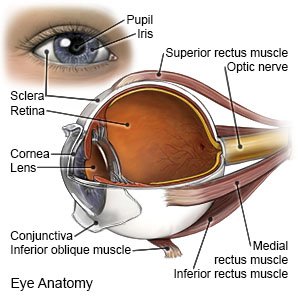Chemical Eye Burns
Medically reviewed by Drugs.com. Last updated on Aug 4, 2025.
AMBULATORY CARE:
A chemical eye burn
is an injury to any part of your eye that is exposed to chemicals. A chemical eye burn is a serious injury and can result in permanent vision loss.
 |
Common symptoms include the following:
- Pain, light sensitivity
- Blurry vision, loss of vision
- Red, swollen eyelid
- Cuts, bumps, or other damage on your eye
- Feeling like there is something in your eye
- Cloudy eye tissue
Call your local emergency number (911 in the US) if:
- Your eyesight is blurry or you lose vision.
- You have cuts, bumps, or other damage on your eyeball.
- Your eye becomes red or cloudy.
Call your doctor if:
- Your eye keeps watering or feels dry.
- Your pupil is larger than usual.
- You have questions or concerns about your condition or care.
Medicines:
- Medicines may be given to prevent infection, decrease pain and inflammation, or relax your eye muscles.
- Take your medicine as directed. Contact your healthcare provider if you think your medicine is not helping or if you have side effects. Tell your provider if you are allergic to any medicine. Keep a list of the medicines, vitamins, and herbs you take. Include the amounts, and when and why you take them. Bring the list or the pill bottles to follow-up visits. Carry your medicine list with you in case of an emergency.
Eye care:
Your healthcare provider or ophthalmologist may give you artificial tears or an eye patch to protect your eye and help it heal.
First aid if you get chemicals in your eye:
- Rinse your eye immediately. Use a steady stream of water for at least 15 minutes . Use the cleanest water you can get to quickly. Never use other chemicals to rinse out your eye. Move your eyeball in all directions to make sure that all the parts are rinsed. If possible, continue to rinse out your eye with water until you reach the treatment center.
- Remove clothing that may still contain chemicals. Do not take out your contact lenses.
- If possible, safely bring the chemical container to show your healthcare provider. Do not bring the container if the chemical may burn you again.
Prevent another chemical eye burn:
- Always wear eye protection , such as goggles, that fit closely around your eyes.
- Do not touch your eyes when you work with chemicals.
- Follow the instructions on the container when you use chemicals that may burn your eyes.
- Make a plan in case you or someone else gets burned. Know where the best water or liquid is located for rinsing your eyes. Check to see if your company has an eye wash station.
Follow up with your eye doctor as directed:
You will need to return to have your eye and vision checked. Write down your questions so you remember to ask them during your visits.
© Copyright Merative 2025 Information is for End User's use only and may not be sold, redistributed or otherwise used for commercial purposes.
The above information is an educational aid only. It is not intended as medical advice for individual conditions or treatments. Talk to your doctor, nurse or pharmacist before following any medical regimen to see if it is safe and effective for you.
Further information
Always consult your healthcare provider to ensure the information displayed on this page applies to your personal circumstances.
